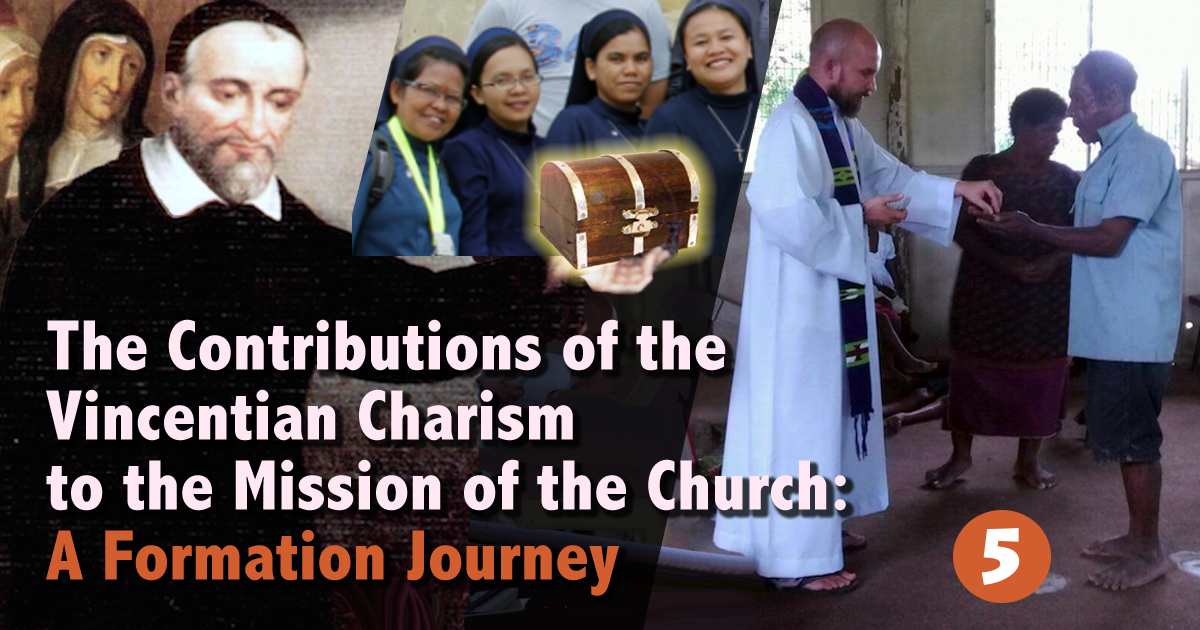This is the fifth of a series of formation packages meant for individual or group study which was introduced in “The Contributions of the Vincentian Charism to the Mission of the Church: A Formation Journey.” In that article, we also suggested a “Lesson Plan” for use in groups.

Vincent, and with him, Louise did for the for Church in 17th century France what Francis is doing for the Church of the 21st century. Through their lives and actions people living on the margins became visible and saw hope.
Father Delgado writes…
The Vincentian charism has contributed to the Church’s mission in the sense that the followers of Jesus Christ are attentive to the world that surrounds them, especially the world of the poor … they see the world as God sees it and as God desires it and thus, they commit themselves to the transformation of the world.
Although it is to a large degree for many the best kept secret of the church and to others a stone of contradiction, Catholic Social Teaching is strongly focused on “seeing” the poor – orphans, widows, children.
One thing is, however, certain: it is not new.
The Gospel of Luke is often called the “Gospel of Mercy.” Luke gives us a perspective to appreciate this section of Father Delgado’s assessment of the Vincentian contributions.
A blind man pleads “Lord, I want to see! (Luke 18:41)”
Two discouraged disciples are trying to make sense of their shattered hope. A stranger walks with them and “their eyes were opened” (Luke 24:31).
In the Vincentian foundational text from St. Luke’s gospel (4:16-21), we witness Jesus on a Sabbath day in his hometown Nazareth. “As he usually did,” Jesus came to the synagogue for worship and he was invited to read. He took the scroll of Isaiah the prophet, searched out its mighty missionary text (61:1-2) and proclaimed: “The Spirit of the Lord is on me, for he has anointed me to bring the good news to the afflicted. He has sent me to proclaim liberty to captives, sight to the blind, to let the oppressed go free, to proclaim a year of favor from the Lord.” Then, after a dramatic pause, Jesus made the astonishing announcement: “This text is being fulfilled today even while you are listening.” (Luke 4:18-21)
What is new about Catholic Social Teaching today is the impact of Pope Francis in bringing this to the attention of our world. A long history of Popes have said similar things but Pope Francis has caught the attention of many. With his gestures toward individuals, his road trips to the peripheries and even his choices of people to fulfill positions of influence in the church, Pope Francis has helped us to see.
Pope Francis has vowed to embrace the world’s “weakest and poorest.”
Among his first words as Pope was that he had to “open his arms to protect all of God’s people and embrace with tender affection the whole of humanity, especially the poorest, the weakest, the least important.” He speaks of “protecting people, showing loving concern for each and every person, especially children, the elderly, those in need, who are often the last we think about.”
In this section Fr. Delgado unpacks his claim that the journey of Vincent and Louise is a history of “beholding” the poor.
- beholding the poor in a manner that expanded as he encountered the poor,
- beholding the poor in a manner that took in all those who were poor,
- beholding the poor in such a manner that from the little parish in Châtillon his vision became universal (eventually extending to Madagascar),
- beholding the poor in a manner that was deepened with the passing of time
(from beholding the poor to beholding Jesus Christ, from beholding Jesus Christ to beholding the poor) [21]
- When I look around me who do I see?
- Can I “see” those on the margins?
- Do I look with love on those at the margins?
See you next week!
| View any or all of the Articles and SlideShares including today’s | |
| Download any or all of the SlideShares as PDF • PPTX |
We hope you’ve enjoyed this collaboration of…







0 Comments